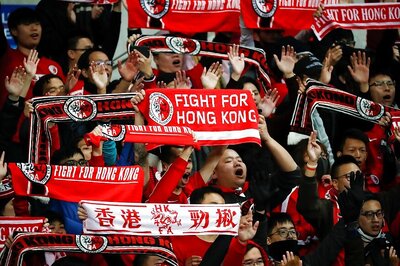
views
Johannesburg: Bollywood film Lage Raho Munnabhai has inspired a slew of protests worldwide using Gandhian methods, such as people swamping officials with flowers. Now it's the turn of the academics to discuss modern Gandhigiri.
Mahatma Gandhi had led a march in South Africa in 1908 to protest a law asking all Indians and Chinese to carry registration certificates with them, and hundreds had publicly burnt such documents following him.
On the centenary of that historic march, the Centre for Indian Studies (CISA) at the Witwatersrand University, Indian Consul-General Navdeep Suri and the Gandhi Centenary Committee on Monday hosted a colloquium on The Bonfire of 1908: Passive Resistance Then and Now.
The Mahatma's great-granddaughter Kirti Menon headed the colloquium. P.K. Dutta of Delhi University, an expert on Indian popular culture, related how Gandhian ideas were now being revived in India in new ways.
Uma Dhupelia-Mesthrie from the University of the Western Cape, a granddaughter of Gandhi, spoke about a housing project next to a busy motorway in Cape Town that has resulted in a lot of social tensions there. She said that Gandhian strategies might have led to a different outcome.
Rehana Ebrahim-Vally from the University of Pretoria shared views on how young Indian people in South Africa understand Gandhi's ideals and how it relates or does not relate to their sense of being of Indian origin.
Ari Sitas, a professor at the University of KwaZulu-Natal, and Crain Soudien of the University of Cape Town spoke about the relevance of Gandhian ideas to new movements that are trying to address globalisation.
Sitas addressed the role of Gandhi in what he called "neo-Gandhians" in the anti-militaristic movements across the globe, while Crain referred to the African Renaissance led by South African President Thabo Mbeki and how Gandhian philosophies might have led to different outcomes in his attempts to bring about such a transformation.
There were also presentations by Raymond Suttner of the University of South Africa and Goolam Vahed, professor at the University of KwaZulu-Natal, on how the African National Congress (ANC) grappled with some of the ideas of non-violence as opposed to the need for a violent struggle in South Africa.
The colloquium ended with a poster presentation by struggle veteran Kantilal Naik, also attached to the host university, who said Gandhi's philosophy was relevant during the five decades of struggle, and was even more relevant now, 14 years down the line of becoming a democratic nation.
"We are now faced with other types of difficulties - crime, fraud, lies, arrogance, self-enrichment, economic meltdown, and rising poverty. What is there left for us, but to adopt Gandhi's principles to bring about some sanity in our country?"




















Comments
0 comment